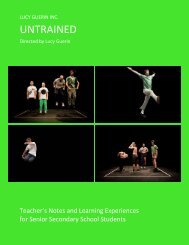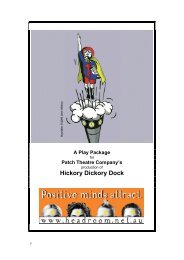Rainbow’s End
Download - Merrigong Theatre Company
Download - Merrigong Theatre Company
- No tags were found...
Create successful ePaper yourself
Turn your PDF publications into a flip-book with our unique Google optimized e-Paper software.
Money for repairs and maintenance on Rumbalara's 65 houses dried up under Howard — with nothing coming<br />
through for two years, running the housing program into the red. The drought broke two weeks ago, with almost $1<br />
million of backdated funds materialising, a move Dean and her deputy, Mick Buckworth, hope signals renewed<br />
support of regional housing.<br />
They regard houses, with education, as the key to everything else. Buckworth, who has been involved in<br />
Rumbalara's housing for 20 years, says he has seen plain evidence of this over those years. Les Briggs is the latest<br />
of many locals he has helped into their own homes over that period, "and every single one of them have kept their<br />
homes. These are people who had never had work, but who have gone out and got labouring jobs, done whatever it<br />
takes to keep it because they know it is the best thing for their families."<br />
A LOCAL report published a couple of years ago included the story of an emotionally disturbed woman referred by<br />
Rumbalara clinic to mainstream mental health services for an urgent home visit, and who found the following<br />
message on her home answering machine: "Get your black arse in here. The doctor's not coming out to see you, no<br />
way." The only surprise the call generated locally was that it had been recorded.<br />
Media coverage of a savage attack on a German backpacker by a group of drunken Aboriginal men two years ago<br />
resulted in a stream of invective from Shepparton locals on a Herald Sun blog site, posting a picture of a community<br />
divided by rife Aboriginal violence and crime. The claims aren't backed up by the observations or statistics of local<br />
police. They say a small group of hard-core Aboriginal offenders are responsible for a disproportionate amount of<br />
violent crime, but that indigenous crime is not a particular problem, though there are ongoing programs to improve<br />
relations and defuse issues such as clan antagonisms.<br />
Both incidents provide a glimpse of the subterranean attitudes that local Aborigines say they confront constantly —<br />
though an increasingly multicultural community profile, generational change, and ripples from Kevin Rudd's apology<br />
to the stolen generations are identified as factors in seeing some of that dissipate. Paul Briggs cites these as reasons<br />
to be optimistic.<br />
Bob Laing, drawing on his own lifetime of observations of New Zealand society, equates the position of Aborigines<br />
now with where Maoris were 40 years ago, adding that Maori advancement since then was assisted by much more<br />
positive attitudes to them and their culture than Aborigines have enjoyed. "How do I say this nicely," he says. "I think<br />
white New Zealanders hold Maoridom in higher regard than white Australians hold Aboriginals."<br />
Working with leaders such as Briggs, Atkinson and Dean, he and his council are increasingly active in efforts to<br />
address this by building Aboriginal cultural identity, value and recognition. They all list these as priorities akin to<br />
health, housing and education programs; without dismantling the walls of cultural perception and disregard, effort on<br />
all other fronts crumbles away. They all claim big steps have been made in the past two or three years. "Identity is<br />
integral to everything," says Atkinson. "It's not about being absorbed into the community, it's about having a place<br />
here, an identity in community."<br />
Atkinson also looks across the Tasman when he tries to imagine what will be required to "close the gaps" between<br />
white and black Shepparton, and white and black Australia. He was there 20 years ago, witnessing the early days of<br />
the Maori effort towards self-determination.<br />
He vividly recalls the nervousness of the community, and its leaders, in taking the leap from the comfortable<br />
constrictions of welfare dependency into self-management and entrepreneurial nation building.<br />
"They looked at themselves first, their cultural identity, at how important it was to maintain that. They looked at social<br />
justice issues, at social economic issues, and some of that meant letting go of the paternalistic welfare structure.<br />
They agonised over it. But look now, the benefits are there," he says.<br />
"They've got land, they've got agreements with government, they've got appointments in Parliament, they've got their<br />
own political party, their own school of business, their own businesses employing their people. They had strong<br />
leaders who persisted in saying what had to be done and they did it."<br />
He looks around Shepparton and imagines a future in which Aborigines are visible, integral players in agriculture,<br />
water management, and other core elements of prosperity. And it begins for him as the Maori journey did, with a<br />
commitment to educating children; to raising them in safe homes; to nurturing leadership; and to building and<br />
broadcasting cultural identity.<br />
Paul Briggs reckons the stirring of much of this is to be seen in the exuberance of the kids training at Rumbalara, the<br />
young players watched by family and coached by emerging community leaders. "We're in a holding pattern," he says.<br />
"We're encouraging kids and people in our community to have a sense of hope that there can be a good future. But<br />
we haven't described what that future is, and to do that, we need non-Aboriginal leadership to work with us, not just<br />
as an Aboriginal community, but as the Shepparton community."<br />
13













